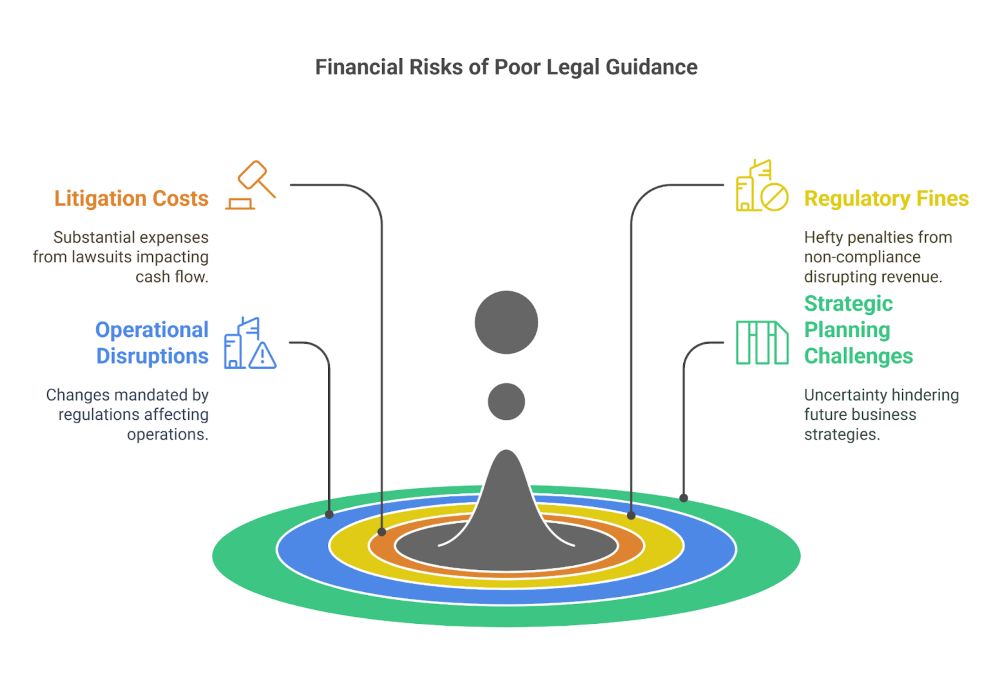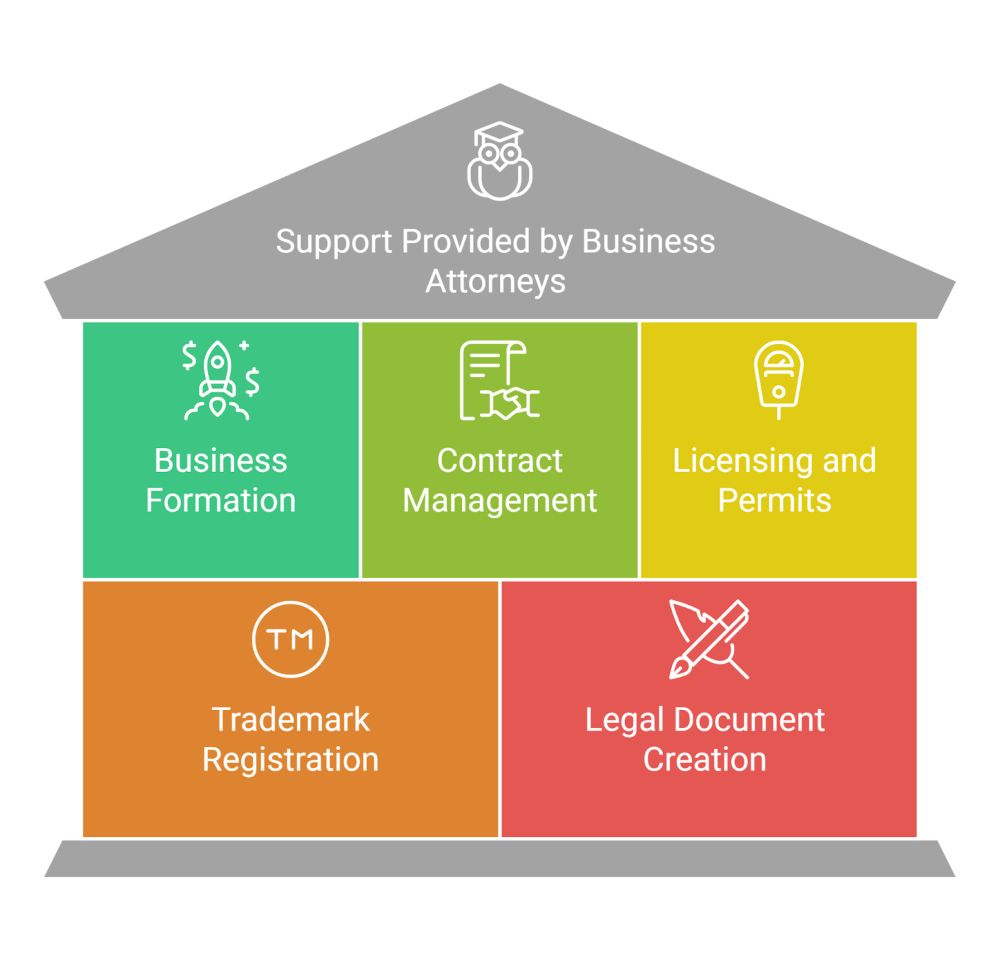Is a Business Attorney Worth It? A Cost-Benefit Analysis for Entrepreneurs
Starting a business involves navigating complex legal waters that can significantly impact your success.
As an entrepreneur, you may wonder if hiring a business attorney is necessary or avoidable.
While legal fees might seem steep for a new venture, investing in qualified legal counsel can prevent costly mistakes and provide valuable protection for your business that far outweighs the initial investment.
The cost of hiring a small business lawyer typically ranges from $150 to $400 per hour, with factors like experience, location, and complexity affecting the final price.
Many entrepreneurs hesitate to add this expense to their already tight budgets. However, an experienced business attorney can protect you from legal liability and help with critical matters such as verifying your business name, drafting contracts, and protecting intellectual property.
The decision ultimately depends on evaluating your business’s risks against the cost structure options available from legal professionals.
Key Takeaways
- Business attorneys provide crucial protection against legal liabilities and compliance issues that can save entrepreneurs significant money in the long run.
- Legal counsel costs vary based on experience and service type. Options for different business needs include hourly rates, flat fees, and retainers.
- Strategic timing of when to engage a lawyer—during formation, contract negotiations, and potential disputes—maximizes entrepreneurs’ value and return on investment.
Why Evaluate The Value Of A Business Attorney?

Entrepreneurs face critical decisions about allocating limited resources while managing significant business risks.
The value of legal counsel must be carefully weighed against its costs to ensure smart investment in your company’s future.
Potential High Costs Of Litigation And Regulatory Non-Compliance
Without proper legal guidance, businesses face substantial financial risks. Even before trial, a lawsuit can cost small businesses between $50,000 and $100,000. These unexpected expenses can devastate cash flow and operational stability.
Regulatory non-compliance carries equally severe consequences. Government agencies may impose fines, business restrictions, or mandatory operational changes that disrupt revenue streams. For example, GDPR violations can result in penalties up to 4% of annual global revenue.
The complex business landscape creates numerous compliance obligations across employment law, intellectual property protection, and industry-specific regulations. Each area represents potential exposure without proper oversight.
Beyond direct costs, litigation and compliance issues drain management focus, damage reputation, and create uncertainty that inhibits strategic planning. These hidden costs often exceed the visible expenses on financial statements.
The Key Role Of A Business Attorney

Business attorneys serve as strategic partners in navigating complex legal landscapes that entrepreneurs face throughout their business journey. They bring specialized knowledge and skills to protect business interests and prevent costly legal mistakes.
Key Services Provided
Business attorneys offer crucial support across multiple areas of business operations. They guide entrepreneurs through business formation processes and help them choose the right structure (corporation, LLC, partnership) based on liability protection and tax implications.
They draft, review, and negotiate contracts with vendors, employees, and clients to ensure favorable terms and protect the company’s interests.
These legal professionals assist with securing necessary business licenses and permits from local, state, and federal authorities.
Many attorneys specialize in trademark registration and the protection of intellectual property rights.
They create and review legal documents such as:
- Operating agreements
- Partnership agreements
- Employment contracts
- Non-disclosure agreements
- Terms of service
When disputes arise, they provide representation in mediation, arbitration, or litigation settings.
How Attorneys Add Value
Business attorneys provide value far beyond paperwork processing. They serve as proactive advisors who identify potential legal issues before they become problems.
Their specialized legal counsel helps entrepreneurs navigate the unique challenges of today’s complex business environment.
By ensuring compliance with regulations, attorneys help businesses avoid costly penalties and litigation.
They bring peace of mind, allowing entrepreneurs to focus on growth rather than legal worries.
While legal services require investment, they offer significant long-term cost savings by preventing expensive disputes and mistakes.
Many attorneys build ongoing relationships with clients, developing a deep understanding of the business. Their expertise becomes particularly valuable during major transitions like expansion, acquisition, or succession planning.
Surge Business Law’s Business Formation Services protect your business from costly legal mistakes. Gain peace of mind and a solid legal foundation—contact us today to get started!
Cost Analysis Of Hiring A Business Attorney
Understanding the financial commitment of legal representation can help entrepreneurs make informed decisions about when and how to engage a business attorney.
The following breakdown examines different fee structures, specific costs, and the financial impact of legal counsel.
Typical Fee Structures
Business attorneys typically offer several payment options to accommodate different client needs. The most common arrangement is hourly billing, which ranges from $150 to $400 per hour depending on experience, location, and firm size.
Many lawyers also provide flat fees for routine services like business formation or contract drafting. This predictable pricing helps entrepreneurs budget more effectively.
Retainer arrangements require an upfront deposit, from which the attorney deducts hourly charges as work progresses. This structure is common for ongoing legal needs.
Some attorneys offer contingency fees (typically for litigation), where payment is a percentage of recovered damages. This option minimizes initial investment but may result in higher overall costs if successful.
Alternative fee arrangements like monthly subscriptions are becoming increasingly popular for startups seeking regular legal guidance without unpredictable billing.
Detailed Cost Breakdown
The complexity of legal matters significantly impacts costs. Simple document reviews might cost $500-1,000, while complex litigation can reach tens of thousands.
Direct Costs by Service Type:
- Business formation: $500-2,000
- Contract drafting/review: $300-1,000 per contract
- Trademark registration: $1,500-2,500
- Employment issues: $1,000-5,000
- Litigation representation: $10,000-100,000+
Location also affects pricing. Urban attorneys typically charge 30-50% more than their rural counterparts. Specialized expertise commands premium rates, with industry-specific knowledge often justifying higher fees.
Hidden costs may include paralegal time, research fees, filing fees, and administrative expenses. Entrepreneurs should request itemized billing to understand all charges and negotiate fee caps when possible.
Opportunity Costs And Long-Term Savings
Entrepreneurs must consider both tangible and intangible costs when evaluating legal representation. While the DIY approach might initially save money, it often leads to costly mistakes that an attorney would have prevented.
The time spent handling legal matters personally represents significant opportunity costs. Instead, hours devoted to researching regulations could be invested in business development or customer acquisition.
Professional legal guidance often results in substantial long-term savings. An attorney can identify tax advantages, prevent regulatory violations, and structure agreements that protect business interests.
The payback period for legal investments varies by situation. Preventative legal work typically offers the best return, as litigation costs far exceed prevention expenses.
Many entrepreneurs report that strategic legal advice paid for itself within 6-18 months through avoided problems and optimized operations.
Business attorneys also provide intangible value through stress reduction, confidence in compliance, and peace of mind—benefits that are difficult to quantify but are valuable nonetheless.
Benefits Of Engaging A Business Attorney
Hiring a business attorney gives entrepreneurs critical advantages beyond simple legal representation.
These professionals deliver measurable value through risk management, operational improvements, and strategic guidance that can significantly impact a company’s trajectory.
Risk Mitigation And Liability Protection
Business attorneys excel at identifying potential legal pitfalls before they become costly problems.
They help entrepreneurs navigate complex regulations that vary by industry and location, ensuring legal compliance and risk management.
Contract review and negotiation represent another crucial protective function. Attorneys spot unfavorable terms that might otherwise go unnoticed, preventing entrepreneurs from entering damaging agreements.
For intellectual property matters, business lawyers safeguard valuable assets through proper registration and protection strategies. This is especially important for media, design, and creative businesses.
Having established legal counsel familiar with your business can dramatically improve outcomes when disputes arise.
They can often resolve issues before they escalate to costly litigation, protecting both finances and reputation.
Ongoing Compliance as Your Business Grows
One of the most overlooked but critical benefits of working with a business attorney is staying compliant as your company expands. Legal obligations don’t stay static—new regulations emerge as your headcount grows, your revenues increase, or you enter new markets.
For example, in Iowa, once your business reaches four employees, you must comply with state non-discrimination laws.
The legal landscape shifts again when you have 15, 20, or 50 employees, with new federal and state-level obligations kicking in—from ADA requirements to FMLA compliance and beyond.
Surge Business Law offers subscription-based legal services designed to help entrepreneurs stay ahead of these evolving requirements.
Instead of reacting to compliance issues, business owners gain peace of mind knowing their legal bases are proactively covered as they grow.
Enhancing Business Efficiency And Credibility
Professional legal guidance allows entrepreneurs to focus on core operations rather than legal concerns.
This saves valuable time and resources that can be redirected toward growth initiatives and revenue generation.
Business attorneys help structure organizations optimally from the start. They help select appropriate business entities (LLC, corporation, partnership) that align with specific goals and provide tax advantages.
Their expertise extends to facilitating smooth transactions:
- Mergers and acquisitions
- Property purchases
- Investment negotiations
- Employee agreements
Competent legal representation signals professionalism to investors, partners, and clients. This enhanced credibility can open doors to opportunities that are closed to seemingly less established operations.
Strategic Advantage And Peace Of Mind
Business attorneys contribute to long-term sustainability by aligning legal strategies with business goals. They help create frameworks that support operational flexibility while maintaining necessary protections.
Their ongoing counsel provides reassurance during critical decision-making. Entrepreneurs report significant peace of mind knowing qualified professionals are monitoring the legal aspects of their business.
Industry-specific knowledge is particularly valuable. Attorneys who understand sectors like real estate, healthcare, or technology can provide tailored advice that generic legal services cannot match.
The attorney-client relationship often evolves into a strategic partnership. Experienced business lawyers become trusted advisors who understand the company’s vision and can anticipate needs before they become urgent concerns.
By preventing legal problems rather than merely responding to them, business attorneys deliver tangible financial benefits through avoided costs and increased opportunities.
From day one to year five and beyond, Surge Business Law’s legal services—including ongoing compliance subscriptions—help businesses avoid costly mistakes and stay ahead of changing regulations. Let’s build a smarter foundation together.
Evaluating The Return On Investment (ROI)
Determining whether a business attorney is worth the investment requires a systematic approach to measuring both financial returns and non-monetary benefits. The true value often extends beyond simple dollar figures.
Quantitative Benefits
Entrepreneurs should use the basic formula for calculating the ROI of legal services: ROI = (Gain from Investment—Cost of Investment) / Cost of Investment. This provides a percentage that shows the efficiency of legal spending.
The tangible financial benefits of hiring a business attorney often include:
- Reduced litigation costs through prevention
- Savings from properly negotiated contracts
- Tax advantages from proper business structuring
- Protection of intellectual property value
- Avoidance of regulatory fines and penalties
A business attorney’s input on contracts alone can save entrepreneurs thousands of dollars by preventing problematic clauses that could become costly later.
For example, a $5,000 legal review that prevents a $50,000 contract dispute generates a 900% ROI.
Qualitative Benefits
Not all benefits can be easily assigned monetary values. Legal departments provide intangible benefits that significantly impact business operations but don’t immediately appear on balance sheets.
These non-monetary advantages include:
- Peace of mind and reduced stress
- Improved business reputation
- Better relationships with stakeholders
- Increased focus on core business functions
- Long-term business sustainability
A competent attorney serves as both shield and advisor, giving entrepreneurs confidence to make bolder business moves, knowing they have proper legal protection.
The time value of having immediate legal support can also translate to faster business growth and opportunity capture.
Another long-term ROI factor is compliance continuity. As your business grows, legal responsibilities increase—especially around hiring, HR, and industry-specific regulations.
Subscription-based legal services ensure you’re always ahead of these changes, reducing the risk of costly penalties, lawsuits, or operational setbacks.
In many cases, the ROI of avoiding just one compliance-related dispute more than covers the cost of ongoing legal support.
Cost-Benefit Analysis Framework
A thorough cost-benefit analysis (CBA) provides a structured approach to evaluating attorney ROI. It weighs all costs against all benefits over time.
Entrepreneurs should follow these steps:
- Identify all costs: Hourly rates, retainers, filing fees
- Quantify benefits: Direct savings and revenue protection
- Assign values to intangibles: Risk reduction, time savings
- Calculate Net Present Value (NPV): Account for the time value of money
- Perform sensitivity analysis: Test different scenarios
A positive NPV indicates the attorney investment is financially worthwhile. Many entrepreneurs find that evaluating legal spend per matter rather than overall provides clearer insights.
The Benefit-Cost Ratio (BCR) offers another metric: dividing total benefits by total costs. A BCR greater than 1.0 suggests a worthwhile investment.
Do you need reliable contract drafting and review? Surge Business Law offers expert legal guidance to ensure your agreements are clear, enforceable, and designed to protect your business. Let’s connect now!
When Is A Business Attorney Most Valuable?
Business attorneys deliver exceptional value during specific moments in your company’s journey. This is when legal expertise can protect assets, prevent costly mistakes, and create strategic advantages for your business.
Stages Of Business Growth
At the formation stage, a business attorney helps entrepreneurs select the optimal business structure (LLC, corporation, partnership). This is based on liability concerns, tax implications, and growth plans. This early guidance can prevent costly restructuring later.
During the expansion phase, legal counsel becomes crucial when adding employees, entering new markets, or securing financing. Attorneys can draft proper employment agreements and ensure compliance with different jurisdictional requirements.
When preparing for acquisition or merger activities, expert legal guidance protects the business during due diligence processes and contract negotiations. They help identify potential liabilities and ensure favorable terms.
In the maturity stage, attorneys assist with succession planning, intellectual property management, and maintaining compliance with changing regulations that may affect established operations.
During the growth stage, businesses encounter new legal obligations that didn’t exist during startup. For instance, in Iowa, businesses must comply with non-discrimination laws once they reach four employees.
At 15, 20, or 50 employees, additional requirements around workplace accommodations, federal employment law, and benefits administration come into play.
Ongoing legal counsel ensures you’re not caught off guard. This is where a legal subscription service becomes incredibly valuable—it scales with your business, helping you stay compliant every step of the way.
Industry-Specific Considerations
Highly regulated industries like healthcare, finance, and insurance require specialized legal expertise to navigate complex compliance requirements. Attorneys familiar with industry-specific regulations can prevent costly violations.
Technology companies benefit significantly from attorneys who understand intellectual property protection. They can safeguard innovations through patents, trademarks, and copyright registrations.
Food and beverage businesses face unique regulatory challenges from the FDA, health departments, and licensing boards. Legal counsel helps maintain compliance and manage potential liability issues.
Service-based businesses need attorneys to draft client agreements, manage liability exposure, and handle potential disputes that arise from service delivery complications.
Businesses with international operations require legal expertise in multiple jurisdictions to navigate trade regulations, foreign business laws, and cross-border transactions.
Critical Scenarios Requiring Legal Counsel
Contract negotiations are crucial when an attorney is involved. They can identify unfavorable terms, ensure adequate protections, and strengthen the business’s position before making commitments.
Dispute resolution scenarios demand immediate legal intervention. Whether facing employee complaints, customer disputes, or vendor disagreements, attorneys can prevent escalation and protect the company’s interests.
Tax complications require specialized legal knowledge, especially when facing audits or implementing tax-advantaged strategies. Business attorneys often collaborate with accountants to address complex tax matters.
Intellectual property threats necessitate swift legal action. If a business faces infringement issues or needs to protect its innovations from competitors, attorneys provide strategic guidance and enforcement options.
Regulatory investigations require immediate attorney involvement to manage communication with authorities, prepare appropriate documentation, and minimize potential penalties or operational disruptions.
Making The Decision: Is It Worth It?
Determining whether hiring a business attorney is worth the investment requires carefully evaluating your unique business circumstances, potential legal risks, and long-term strategic goals.
This decision affects your bottom line and your company’s compliance, risk management, and growth potential.
Assessing Your Business Needs And Risk Profile
Every business faces different legal challenges based on its industry, size, and growth stage.
Start by conducting a thorough cost-benefit analysis of your specific legal needs. Consider your business structure, regulatory environment, and intellectual property requirements.
Companies with complex contracts, significant intellectual property, or operating in heavily regulated industries typically benefit more from ongoing legal counsel.
For example, healthcare or financial services businesses face strict compliance requirements requiring specialized legal expertise.
Risk factors to evaluate include:
- Potential legal exposure in your specific industry
- Transaction volume and complexity of your business deals
- Growth trajectory and plans for expansion or funding
- Employee count and associated HR legal considerations
Small businesses with minimal regulatory oversight and standard transactions may need only periodic legal consultations rather than retaining counsel.
Key Considerations For Entrepreneurs
The high cost of litigation can devastate an unprepared business. Standard business disputes can cost hundreds of thousands in legal fees, making preventative legal counsel a wise investment.
Entrepreneurs should weigh both short-term costs and long-term benefits. While attorney fees may seem substantial initially, they often prevent more costly issues.
Key factors to consider include:
- Cost structures – hourly rates vs. flat fees vs. retainers
- Specialist expertise needed for your industry
- Impact on stakeholders and business relationships
- Brand reputation protection value
- Ethical considerations in your decision-making process
Many attorneys offer free initial consultations, allowing entrepreneurs to assess fit before committing. This provides an opportunity to evaluate their understanding of your business model and communication style.
Steps To Evaluate And Hire A Lawyer
Begin by identifying specific legal needs that require professional assistance. Consulting a business attorney can prevent costly errors and help entrepreneurs make informed decisions.
Step 1: Research and gather recommendations
- Ask trusted business colleagues for referrals
- Research attorneys specializing in your industry
- Read client reviews and check bar association standing
Step 2: Interview potential attorneys
- Ask about their experience with businesses similar to yours, fee structures, and communication styles.
- Evaluate their understanding of your industry and specific challenges
Step 3: Review engagement terms
- Review the scope of services, fee arrangements, and communication expectations before signing.
- Experienced legal counsel is essential for navigating complex legal issues effectively.
Conclusion
Hiring a business attorney represents a significant investment. It delivers substantial returns for entrepreneurs who approach the decision strategically.
The value becomes evident when considering the legal protection, risk mitigation, and specialized expertise attorneys provide.
For startups with limited budgets, a hybrid approach often proves most cost-effective. This involves handling routine matters independently while reserving attorney consultations for complex legal issues or document reviews.
Entrepreneurs should consider their business complexity, industry regulations, and growth plans when evaluating legal needs.
Unlike an online retailer, a construction company with significant liability concerns requires legal support.
Legal needs evolve with your business. What worked when you launched might not be enough once you manage a team or expand operations.
Ongoing legal guidance—such as subscription services—ensures you stay compliant, protected, and informed. It’s not just about avoiding risk; it’s about growing smarter.
Wondering if a business attorney is worth it? Surge Business Law’s Intellectual Property Protection services can safeguard your brand and assets—schedule a consultation today!
The ultimate recommendation balances pragmatism with protection: invest in legal counsel for foundational business elements and high-risk areas while developing basic legal literacy for day-to-day operations.
Frequently Asked Questions
What Does a Business Attorney Do for Entrepreneurs?
A business attorney provides legal guidance on business formation, contract drafting, regulatory compliance, intellectual property protection, and dispute resolution, helping entrepreneurs avoid costly legal mistakes.
How Much Does It Cost to Hire a Business Attorney?
The cost of hiring a business attorney ranges from $150 to $400 per hour. Flat fees are charged for specific services, such as business formation or contract drafting, and retainer options are available for ongoing support.
When Should a Small Business Hire a Business Attorney?
Entrepreneurs should consult a business attorney during critical stages such as business formation, contract negotiations, intellectual property filings, compliance checks, and when facing potential disputes.
What Are the Benefits of Having a Business Attorney?
A business attorney helps mitigate risks, ensure compliance, protect intellectual property, draft enforceable contracts, and provide peace of mind, ultimately saving time and money in the long run.
Is It Worth Hiring a Business Attorney for Startups?
Yes, hiring a business attorney for a startup is worth it. They offer strategic guidance, help avoid legal pitfalls, and set a strong legal foundation, crucial for sustainable growth and protection.
Can a Business Attorney Help Avoid Litigation?
Absolutely. Business attorneys can draft solid contracts, mediate disputes, ensure regulatory compliance, and advise on risk management, significantly reducing the likelihood of costly litigation.
How Can a Business Attorney Save You Money?
By preventing legal errors, avoiding fines, securing favorable contracts, and identifying tax advantages, a business attorney offers a strong return on investment through long-term financial savings.


